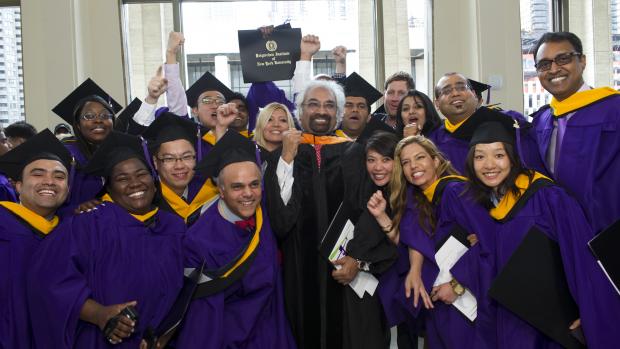In a Graduation State of Mind: Commencement Exercises of 2012 Celebrate Newest Alumni

Donning uncharacteristic black shades, Jerry Hultin, president of the Polytechnic Institute of New York University (NYU-Poly), took leave of the graduating Class of 2012 from the center podium of Avery Fisher Hall at Lincoln Center last Friday, saying, “Engineers rock,” before striding over to a Yamaha synthesizer to his right. There he played a rollicking tune by blues master Willie Dixon—done by way of Muddy Waters, Hultin said—before the loudspeaker segued into hip-hop mogul Jay-Z’s “Empire State of Mind” for the dais recessional. Students whooped as the song serenaded the exiting President, administration, faculty, staff and Honorary Degree recipient, Sam Pitroda, capping a morning of speeches that exhorted the graduates to aim for goals that benefit not just themselves, but those less fortunate.
Hultin had touched on that theme earlier in the ceremony in his address to the graduates. “We are depending on all of you,” he said. “The possibilities for you to literally change the world abound, so decide where you want to make your difference. You have the training and the skills now to succeed.”
Hultin listed reminders of that training, mentioning NYU’s engineering centers in Abu Dhabi and Shanghai; NYU-Poly’s student-run Entrepreneurship and Innovation Association (EIA) — now at 400 student members and counting — and the new bioengineering and biomedical programs the Institute is developing, as well as the NYU Center for Urban Science and Progress (CUSP) soon to be housed next to NYU-Poly’s Brooklyn campus.
“The world we have delivered to you is full of challenges,” he told the graduating class, “but you are well positioned to solve them.”
Problem-solving was emphasized by Sam Pitroda, Advisor on Public Information Infrastructure and Innovation to India’s Prime Minister and recipient of this year’s honorary degree. In receiving the degree from Jeffrey Lynford, Vice Chair of NYU-Poly’s board of trustees, on behalf of NYU-Poly, Pitroda shared his humble beginnings with the audience — how he grew up in a rural Indian village with no schools, water or doctors; how his mother raised eight children who were all birthed at home; how he was the first in his family to receive a college degree. That personal history informed his later observations.
“I have learned that the best brains in the world are busy solving the problems of the rich, who don’t really have problems to solve,” Pitroda said. “As a result, problems of the poor don’t get the talent [they] require.”
That has not been the case with Pitroda, who, after a successful career as an entrepreneur in America, returned to India in the 1980s and began working on the country’s weak telecommunications network. It used to take fifteen years to receive a connection for a landline in India, he told the crowd. Now the country counts 900 million mobile phone users. Spearheading such change has crowned Pitroda the father of India’s telecommunications revolution, and there are suggestions in the Indian press that he may be a candidate for the nation’s President.
Certainly Akshay Joshi, who graduated with a master’s degree in electrical engineering, had heard of Pitroda. He is from the same region in India as me, explained Joshi, who described his countryman’s speech as “very great.”
While Joshi won’t be traveling to India just yet — there’s a job for him in Long Island after graduation, he said — he does plan on returning and following in Pitroda’s footsteps. For now, however, New York is “like a second home,” said Joshi, beaming.




